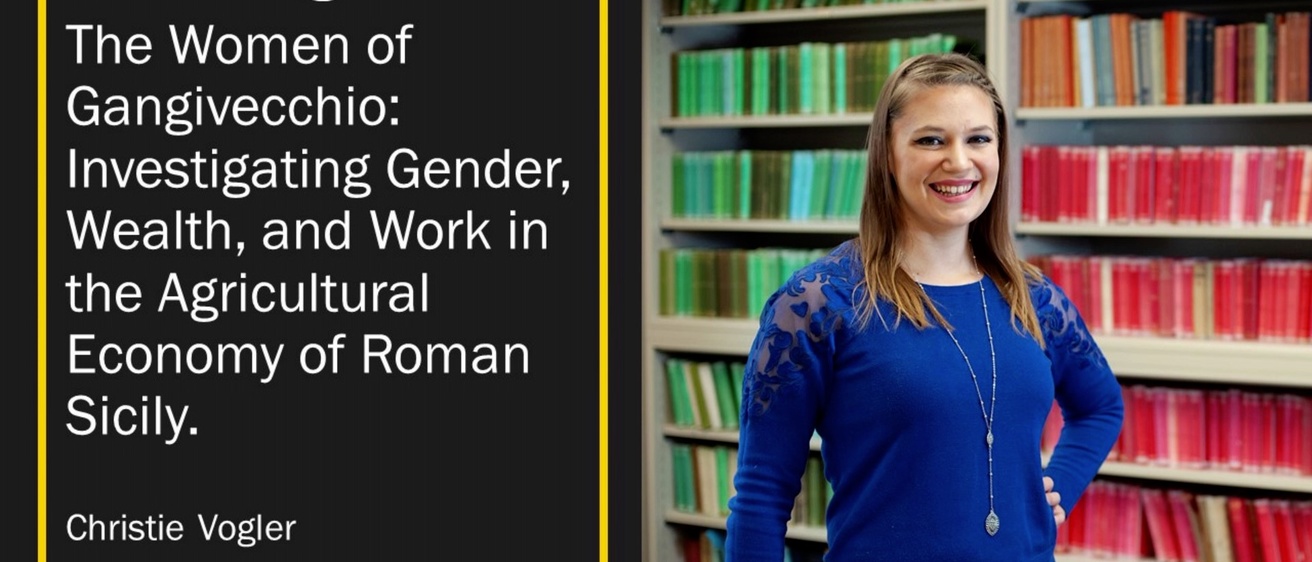As an archaeologist, Christie Vogler says it’s important for people to have a true picture of what she does for a living.
“Archaeologists are fantasized and represented in media in ways that are not very accurate,” says the University of Iowa doctoral candidate in Classical archaeology. Too often, she says, the traditional portrayal of an archaeologist’s life is one of swashbuckling adventure, à la Indiana Jones. While her professional life is often an adventure, it’s rarely swashbuckling.
“It’s important to explain to people what it’s really like,” says Vogler.
To help change peoples’ perceptions of her field, Vogler participated in this year’s Three Minute Thesis (3MT) competition. The annual event, sponsored by the UI Graduate College, encourages graduate students to learn how to clearly and concisely articulate their research to non-specialist audiences by explaining what they do in three minutes or less.
Vogler discussed her research into the contributions women made to medicine in the ancient Roman world. She frequently visits a site in Gangavecchio, Sicily, where hair pins and other evidence from the excavation suggest a Roman villa there had a doctor who was a woman, a rarity in the ancient world.
She prepared by whittling her initial presentation down to four paragraphs, then practiced for weeks on anyone who would listen. (“My fiancé has heard it more times than I can count,” she says.) She went over it again and again whenever she had a few minutes, sometimes even talking just to herself, timing it on her Fitbit to get under three minutes. (It ultimately clocked in at 2:55.)
The work paid off, as the judges at the 2019 3MT competition named Vogler’s the best presentation and awarded her the $500 first prize.
“It’s increasingly important for academics to explain their research to a general audience that shows the value of the work they do and why it’s important to do that work,” says Braden Krien, a career and fellowship advisor in the Graduate College who is part of the team that oversees the event. That means stripping your research down to its bare essentials and avoiding jargon and technical terms that likely will confuse people outside the field.
“The ability to explain concisely is very important,” says Krien. “Graduate students are taught to go into great depth and speak with a certain language, which those outside their field may not understand. Tell people about what you do in ways that make people want to know more.”
This year, 12 students were chosen from an initial 75 registrants to compete in the finals, held Nov. 15 in Art Building West. Before the competition, entrants could participate in three workshops that offered tips on presentation, organization, and stage presence. The competitors were allowed only one PowerPoint slide, so they had no multimedia crutch.
“I learned presentation skills in the workshops that are more theatrical than what I’ve thought about before,” says Claire Muerdter, a doctoral candidate in civil and environmental engineering. “For example, pacing and breathing, don’t memorize the speech word for word, thinking about your stance, or walking across the stage to make a point. All of that makes a difference.”
Muerdter researches how duckweed and other plants can be used to clean up pollution from waterways. As graduation approaches, she says the 3MT exercise will help her in job interviews.
“I can explain my work and why it’s cool and why I’m giving years of my life to it,” she says.
The presentations themselves were akin to TED Talks, with the research subjects spanning a variety of topics from both the sciences and the humanities (including the causes of leishmaniasis, the effect of PCBs on premature births, how embodied flight stories from American slavery continue to resonate in African-American literature, and the collective memory, or lack thereof, of slavery in former French colonies).
The finalists’ presentations were smooth and polished, with only a few hiccups. A countdown timer on the screen added drama, but while some students cut it close by using every last second, most left as much as 30 seconds on the table.
Honorable mention awards of $250 went to Mackenzie Spicer, a molecular medicine doctoral student whose research focuses on the mechanisms that underlie the development of Parkinson’s disease, and Enrico Bruno, a doctoral candidate in English who studies the theme of human flight in African-American literature.
Spicer also received the $250 People’s Choice award based on a vote of the 100 or so audience members.
Other competitors included:
- Vahid Eghbal Akhlaghi, doctoral candidate in management sciences.
- Haydar Al-Jaafari, doctoral candidate in chemical and biochemical engineering.
- Nazmin Akter Eti, doctoral candidate in the College of Public Health.
- Hadley Galbraith, doctoral candidate in French and francophone world studies.
- Barbara Kagima, doctoral candidate in geographical and sustainability sciences.
- Murphy Keller, doctoral candidate in the Interdisciplinary Immunology Training Program.
- Hannah Molitor, doctoral candidate in environmental engineering.
- Rasheid Smith, doctoral candidate in pharmaceutical sciences and translational therapeutics.
